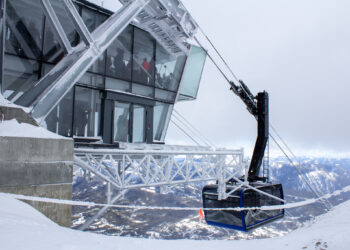Idea presented to joint county commissions
By Amanda Eggert EBS Senior Editor
BIG SKY – The Gallatin and Madison county commissions met on Nov. 1 to receive updates on infrastructure, governance, and bond issues before Big Sky.
Approximately 40 people attended the meeting, which was held at the Big Sky Water and Sewer District board meeting room. All six commissioners—three from each county—attended the meeting.
Big Sky Community Organization Executive Director Ciara Wolfe described the nearly $10.3 million grant that the Big Sky Chamber of Commerce has applied for in conjunction with BSCO. There’s an impressive number of applicants for a small number of grants, but it could turn into a big win—and prove to be transformational for Big Sky—if the application is successful, Wolfe said.
It’s a Transportation Investment Generating Economic Recover, or TIGER, grant, and if it’s awarded to Big Sky, a whole host of improvements could result, including left-hand turn lanes along Highway 64, also known as Lone Mountain Trail; a pedestrian tunnel to safely cross Highway 64 at lower Little Coyote Road; trail system expansions in the heart of Big Sky; additional signage for dangerous curves on Highway 64; and the expansion of Skyline’s van and motorcoach fleet to relieve strain on the highly-used bus system around Big Sky and between Bozeman and Big Sky.
“They might give a percentage of the $10 million and they might say, ‘We’ll do this, but not this,’” said Joe Skinner, a member of the Gallatin County Commission.
Wolfe said Big Sky is at an advantage because it’s a rural community—larger areas require matching funds, she said.
Margo Magnant, the Big Sky Chamber of Commerce membership director gave the commissioners a brief run-down on the nascent process to form a local council that would handle issues of overarching concern to the boards of Big Sky’s seven distinct districts. She said the process is just taking shape, but the overall goal is to have “an organized format for community members to come together on large issues.”
Skinner recommended that whatever form the collective takes, it remain small. “I would challenge you not to get that big,” he said, referencing the estimate of 20 to 30 people provided by Magnant. “I would [recommend] more like a city council-type size.”
Big Sky Chamber of Commerce CEO Candace Carr-Strauss was ill and unable to attend the Nov. 1 meeting, but in a Nov. 8 interview with EBS, she said the chamber’s effort was spurred in part by large infrastructure discussions happening in the community surrounding water and wastewater, energy infrastructure, workforce housing and transportation issues.
“Is it just making sure that everyone is on the same page [or] is it going to have authority in the future—that remains to be seen,” Strauss said.
Strauss said she’s been receiving one to two calls per week about how the chamber might help facilitate a dialogue around these big issues and projects Big Sky is grappling with.
The chamber is looking into hiring a facilitator, namely Dan Clark, the director of Montana State University’s Local Government Center. If hired, Clark could advise those involved with the effort about what the membership, scope and authority of the group might look like.
It’s too early to tell if the council would be elected or appointed, Strauss said. “We want to convene the right group of people to get us on the path to get some answers.”
There are a number of communities that serve as blueprints that could be followed in areas like Cooke City, Gardiner and Seeley Lake, Strauss said.
Strauss said that although the chamber’s announcement about their efforts might appear premature, they’re trying to be fully transparent about the process and their intentions.
In the joint county commission meeting, Jim Hart with the Madison County Commission proved a bit prescient when he raised the possibility of a special session for the 2017 Montana Legislature to help the state restructure its budget.
Gov. Steve Bullock has since called for the Legislature to meet in a special session on Nov. 14 to address a projected $227 million budget shortfall.
The shortfall clearly weighed on the commissioners, as they spoke about the kind of funding that could pass from the state to county budgets as the state feels a squeeze on its finances.
“We find that we have new things that have to be paid that used to be paid for by the state legislature,” White said, adding that it takes a while for property owners to see those increases in their taxes—up to 18 months.
Hart said that it’s rare for the governor to call a special session. “It’s rare in part because it’s expensive,” he said.
The Gallatin County Commissions also spoke at length about their support for a new or remodeled Law and Justice Center—even if that means getting only a portion of what they asked for from voters earlier this year rather than the full project.
White said they might decide to propose a different mill levy next June, perhaps one that would fund only the justice—courthouse—part of the past proposal, or only the law enforcement half.
Another topic of discussion centered on the open space bonds in Gallatin County. The most recent bond ran out this fall. White spoke to his recent decision not to put another open space bond before voters, saying he thinks it’s more important that other county needs are met.
“My priority right now is for the L and J,” he said, adding that the city attorney’s office, Gallatin County Sheriff’s Office and Bozeman City Police have asked him not to put an open space bond before voters. He said he wasn’t convinced that the proposal submitted to the commission this fall was dedicated to funding publicly accessible projects like trails and regional parks.
“I’m convinced that in the next couple of years, at least in Gallatin County, you’re going to see another open space bond,” Skinner said. “It’s been appropriated twice by the voters, two $10 million bonds…and I think you’ll probably see another $10 million or $20 million bond on the ballot in another year or two.”
Finally, the commissioners discussed how a shortage of funding for public services presently supported by state dollars might lead to unfortunate outcomes for Gallatin County.
“The mental health thing—that’s a crisis,” White said.
“You’ve got to look at the whole big picture,” said Gallatin County Commissioner Don Seifert. “You’ve got detention, you’ve got mental health, you’ve got pre-release, you’ve got Fresh Start—all of these programs out there…When any part of that system fails, where it shows up is in the detention center.”
The next joint meeting between the two commissions has been tentatively scheduled for April, and if it follows the recent pattern, it will be held in the Madison County portion of Big Sky.














